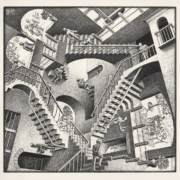A reader’s guide
What does it mean to think about institutions? What is the relationship between functions of thought and institutions? In this special issue, we aim at developing possible answers to these questions.
The real functioning of institutions is a complex phenomenon because it is a human one: it is rooted in the boundaries that people meet when they think, in the emotions that they feel at work, in the needs that they satisfy when they imagine.
The institution is an ensemble of rules, a physical place, a matrix of symbols, but most of all a meeting point of people and their mental representations. Within it, both individual and collective desires, ways of feeling and emotions mingle together. The institution is thus a complex and multidimensional structure in which personal thought and collective logic interact, each with their specificities and criticalities.
The outcome of this interaction is neither pre-determined nor inevitable. In the various contributions of this issue, we reflect on how it can be creative, by containing parasitical and persecutory aspects and opening a space for integration of different, not always convergent, perspectives. Read more

